Impact Stories from Education Diplomacy/Mentoring Policy Area
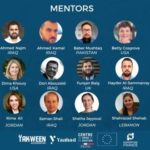
Mentor and fellows collaborate for Iraq’s first accelerator
Fellow(s): Eileen Brewer (mentor), Shahrazad Shehab, Shatha Jayyousi
Country: Jordan, Lebanon, United States
Cohort: 2013, 2019
Policy Area(s): Economic Impact, Education Diplomacy/Mentoring, Entrepreneurship, Professional Growth
Recently, longtime TechWomen mentor Eileen Brewer moved to Sulaymaniyah, Iraq to serve as the director of Takween Accelerator, Iraq’s first startup accelerator based at The American University of Iraq Sulaimani. This week, Takween selected 12 local startups for their first cohort as well as 18 mentors and experts to help train and develop the founders.
Of the 18 mentors selected are 2013 fellow of Jordan Shatha Jayyousi and 2019 fellow of Lebanon Shahrazad Shehab. Shatha is the digital factory manager at Orange Jordan as well as a co-founder of Code on the Road, a 2018 AEIF-winning project that empowers women, girls and vulnerable populations through ICT skills, business and entrepreneurship training. Shahrazad is the managing partner and digital strategist at Creative Consults as well as a digital marketing trainer. Over the next 18 months, Eileen, Shatha and Shahrazad will support the Iraqi entrepreneurs, training them on product and market development, creating sustainable business plans, pitching and more.
Report Date...: 9/7/20
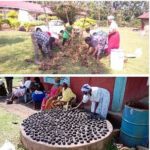
Fellow launches agro-waste initiative to empower rural women
Fellow(s): Linah Anyango
Country: Kenya
Cohort: 2019
Policy Area(s): Education Diplomacy/Mentoring, Empowering Women and Girls, Entrepreneurship, Environmental Sustainability, Professional Growth
In rural Kenya, women walk long distances to collect firewood for cooking in their homes. 2019 fellow Linah Anyango wanted to create a solution that would not only provide cleaner, cheaper and more renewable energy sources, but also bring income to the women and their communities. Her newly launched CBO, Kanyadhiang’ Briquettes Nyale – which translates to “Briquettes are our solution” – aims to use readily available agricultural waste to provide sustainable fuel for women in rural Kenya.
Inspiration for the project began with the Girls in STEM Club that Linah founded at her school. Together, Linah and her students create clean energy solutions from waste products, including using charcoal dust to make briquettes. “I extended this project to women in rural parts of Kenya, since women are the most affected when it comes to access to clean and renewable energy,” she says.
This month, Linah hosted a one-week training where she guided groups of women in making briquettes from agricultural waste. The training focused on making briquettes from water hyacinth, an invasive plant species that threatens water sources and creates health risks. Moving forward, Linah will use her network to help the women sell their briquettes. “Ensuring that women and girls have energy access is not just about women’s rights – it’s a fundamental human rights issue,” she says.
Report Date...: 8/31/20
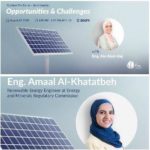
Fellows collaborate for webinar on solar energy
Fellow(s): Aia Abul-Haj and Amaal Al-Khatabeh
Country: Jordan
Cohort: 2018
Policy Area(s): Education Diplomacy/Mentoring, Entrepreneurship, Environmental Sustainability, Professional Growth
2018 fellows Aia Abul-Haj and Amaal Al-Khatabeh were recently featured in a live webinar event, sharing their perspective on solar power and the future of energy. The webinar was hosted by Phi Science Institute, a Jordan-based non-profit that brings science education to youth in Jordan and the Arab world.
In “Outside the Barrel: Solar Energy, Opportunities and Challenges,” Aia, the co-founder of renewable energy company SOLVillion Co, and Amaal, a renewable energy engineer, discussed the latest solar technologies and entrepreneurship within the solar field. The attendees, comprised of new graduates and researchers, had the opportunity to ask Aia and Amaal about their career choices as well as solicit advice on breaking into the energy fields. The fellows also spoke about solar energy during the COVID-19 pandemic, sharing how Jordan and other parts of the world have responded to an increase in solar consumption.
Report Date...: 8/31/20

Fellow pilots STEM program for girls
Fellow(s): Gunesh Bakgalova
Country: Turkmenistan
Cohort: 2019
Policy Area(s): Education Diplomacy/Mentoring, Empowering Women and Girls, Youth Engagement
After TechWomen, 2019 fellow Gunesh Bakgalova returned to Turkmenistan determined to pay it forward to girls in her community. “I set a target for myself to help at least three girls to help them pursue some STEM career,” she says. After finding sponsorship through her own company as well as other local organizations, Gunesh created a pilot program for teenage girls who are motivated by STEM but lack the resources to pursue their educational interests.
Gunesh partnered with the director of a local education center that offers IT education, working together to find girls from marginalized communities who were interested in mathematics and coding courses. Although the COVID-19 pandemic interrupted selection and planning, Gunesh was able to select a high school girl who was then provided a comprehensive beginners coding course. “Her performance is really good,” says Gunesh. “I am going to help her with continuation of her education in the IT field.” Gunesh hopes to continue the program in order to connect more girls to educational resources and encourage them to pursue STEM fields.
Report Date...: 8/31/20

Fellows launch Central Asia mentoring platform
Fellow(s): Elena Selezneva, Saida Yusupova
Country: Uzbekistan
Cohort: 2016
Policy Area(s): Education Diplomacy/Mentoring, Empowering Women and Girls, Entrepreneurship, Professional Growth
2016 fellows Elena Selezneva and Saida Yusupova have launched Mentoring Platform for Central Asia, an initiative that seeks to connect mentors to startups in Central Asia. The project is a part of Tech4Impact, an NGO the fellows established in 2019 to nurture IT, innovation, green tech and women’s entrepreneurship in Uzbekistan and throughout Central Asia. TECH4Impact’s programs include participation in a yearly Ideathon, startup conferences, Technovation Uzbekistan and more.
Through their new platform, the fellows will match businesses to both regional and international mentors. “We have [a] lack of local mentors, and the idea is to provide mentorship opportunities to local startups,” says Elena. They have already recruited 2016 fellow Ozoda Ismailova and longtime TechWomen mentor Erin Keeley to serve as mentors on the platform. Over the last few months, Erin has delivered three webinars for the initiative, including one on customer development.
This week, the fellows held a mock sales pitch event for startups from ClimateLaunchpad, a global green tech competition, as well as startups from a local science accelerator. Soon they plan to engage the TechWomen alumnae community and local leaders in order to strengthen the network of mentors on their platform.
Report Date...: 8/17/20

Mentor(s): Tanu Chellam (Mentor)
Company: Autodesk
Mentor Type: Professional
Policy Area(s): Education Diplomacy/Mentoring, Empowering Women and Girls, Entrepreneurship, Professional Growth
TechWomen Professional Mentor Tanu Chellam was named a recipient of the YWCA Silicon Valley’s Tribute to Women Awards, an annual event that honors women executive leaders and emerging leaders throughout Silicon Valley. The awards’ sponsor, YWCA, is a local organization that works to eliminate racism and empower women in Silicon Valley through advocacy and programming. One of their initiatives, Curated Pathways to Innovation, supports women and underrepresented minorities in pursuing a career in STEM.
Each year the awards ceremony honors up to 50 women leaders and attracts over 800 attendees. Tanu, who worked as a product management lead at Autodesk, was selected for her achievements in her field and for expanding professional opportunities for other women. She has since relocated to London to serve as co-founder and head of product at a startup.
Report Date...: 8/10/20
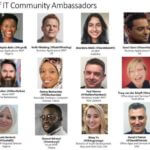
Fellows nominated as Microsoft Community Ambassadors
Fellow(s): Ouafa Benterki and Fatima Zohra Benhamida
Country: Algeria
Cohort: 2012, 2017
Policy Area(s): Education Diplomacy/Mentoring, Professional Growth, Youth Engagement
Fellows of Algeria Ouafa Benterki (2012) and Fatima Zohra Benhamida (2017) were recently selected as community ambassadors for the Microsoft Humans of IT initiative. Community ambassadors work together to share tech for good expertise, create positive social impact and mentor Microsoft student ambassadors who are developing career paths in STEM. This year’s Humans of IT initiative is in partnership with five Historically Black Colleges and Universities (HBCUs), where community ambassadors will collaborate alongside the institutions’ computer science faculties to create opportunities for student ambassadors to do tech for good projects alongside IT professionals.
Ouafa, founder of the first Algerian women-led startup specializing in artificial intelligence, was appointed as a Microsoft regional director last year, becoming the first Algerian and first African woman to hold the role. Fatima, an assistant professor of computer science and board member of the TechWomen/TechGirls Club Algeria, was also recently awarded by Microsoft as a Most Valuable Professional (MVP). The MVP award is attributed to experts in recognition of their exceptional leadership and as appreciation for their outstanding volunteering contributions in technical communities. “When I started volunteering, all I wanted was to help youth within my community to thrive and have practical insights about STEM”, Fatima says. “My motivation and eagerness to give back to the community is stronger and I’ll make sure the more I learn, the more I will share.”
Report Date...: 8/3/20
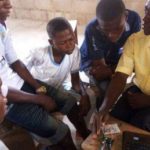
Fellow shares insights on using open source tools for teaching
Fellow(s): Chioma Ezedi
Country: Nigeria
Cohort: 2016
Policy Area(s): Education Diplomacy/Mentoring, Professional Growth, Youth Engagement
TechWomen mentors Jessica Dickinson Goodman and Fatema Kothari, both board members of the Internet Society of the San Francisco Bay Area, recently started a blog series on the organization’s website, highlighting tech leaders from outside of the United States. Chioma Ezedi, 2016 fellow of Nigeria, contributed to the series, writing about how she is using open source tools such as Arduino to teach computer science in rural Nigeria.
Chioma is a software developer who is passionate about education technology and currently serves as a project lead and mentor at STEMTeers, an initiative to inspire, engage and promote children and youth into STEM. In the blog post, she outlines the challenges STEM education is facing in Nigeria due to the lack of infrastructure and equipment, which has been further exacerbated by schools closing due to the pandemic. With the increasing availability of open source resources being iterated and improved upon, she sees the opportunity for them to enhance students’ learning during this time and beyond: “I realized Open Source is for more than free tools, software or hardware; it was a great opportunity to learn, learn by building and create with innovation.”
Report Date...: 7/27/20
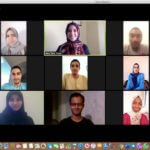
Fellow(s): Alaa Khoja
Country: Libya
Cohort: 2019
Policy Area(s): Education Diplomacy/Mentoring, Empowering Women and Girls, Professional Growth, Youth Engagement
This week, 2019 fellow of Libya Alaa Khoja celebrated the completion of Teccamp, an eight-week web and mobile app course for young students in Libya. Teccamp is run through Alaa’s employer, Tatweer Research, a company that educates and empowers Libya’s young entrepreneurs. Alaa works as their community development officer, responsible for selecting Teccamp’s trainers and applicants as well as supervising the program. Teccamp’s goal is to instill in its graduates an entrepreneurial spirit, inspiring them to start businesses of their own.
Originally planned to be in-person, the course was moved online due to the COVID-19 pandemic. Alaa and her team also faced internet issues and persistent 10-hour power outages, requiring them to try different technologies and work together to usher the students through the learning process. Ultimately, their students – mostly comprised of university students and new graduates — were trained in front-end and back-end languages, database design and app development. Trainees also applied their knowledge to innovative projects that they presented at the conclusion of the course. “Teccampers went through a lot this time,” said Alaa. “But nothing inspired me more than their stamina and their love of learning.”
Report Date...: 7/20/20

Fellows host live session for TechWomen seed grant project
Fellow(s): Asna Javed, Ayesha Mumtaz Kahn, Asmara Rahat, Farhat Yasmeen and Zeenat Anjum
Country: Pakistan
Cohort: 2019
Policy Area(s): Education Diplomacy/Mentoring, Entrepreneurship, Professional Growth
Recently, the 2019 TechWomen seed grant-winning team who created Bachaoo held a live session on dealing with the trauma of child sexual abuse. Fellows Asna Javed, Ayesha Mumtaz Kahn, Asmara Rahat, Farhat Yasmeen and Zeenat Anjum founded Bachaoo in order to create awareness around child sexual abuse and advocate for children and victims in Pakistan.
Their Facebook Live session featured Ambreen Qureshi, an integrative therapist who spoke about the different types of trauma, shared how parents can identify signs of sexual abuse and gave tips on how to reach out to mental health professionals. Soon, the fellows will host another Facebook Live conversation with an educationist and therapist on children’s emotional health. “Overall, we are making great progress,” says Asna. “We have more than 2,000 followers now. People are reaching out to us and want to be a part of the cause.”
Report Date...: 7/20/20

